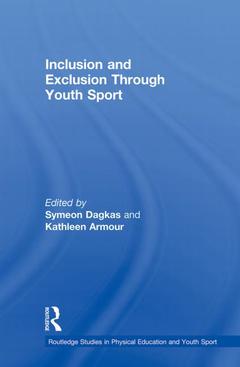Description
Inclusion and Exclusion Through Youth Sport
Routledge Studies in Physical Education and Youth Sport Series
Coordinators: Dagkas Symeon, Armour Kathleen
Language: English
Subjects for Inclusion and Exclusion Through Youth Sport:
Keywords
Youth Sport; physical; Young Men; education; Physical Education; young; Sport Participation; people; Young People; participation; Symeon Dagkas; activity; UK Sport; england; Muslim Girls; muslim; Mainstream Sport; girl; Body Modesty; school; Disability Sport; Women’s International Sports Movement; Beauty Walk; Deliberate Play; Youth Sport Programs; Girly Girl; Young People’s Voices; South Asian Girls; EU Resident; Post-secondary Dance; Single Sex Pe; Physical Education Curriculum Models; Dance Education; Pe Class; Sport Developers
Publication date: 04-2013
Support: Print on demand
Publication date: 08-2011
Support: Print on demand
Description
/li>Contents
/li>Readership
/li>Biography
/li>
'We can reach far more people through sport than we can through political or educational programmes. In that way, sport is more powerful than politics. We have only just started to use its potential to build up this country. We must continue to do so.' ? Nelson Mandela
Nelson Mandela's statement reflects a widely held view that sport can contribute in unique and far-reaching ways to the delivery of important social outcomes. But is this really the case? Can sport bring people from different backgrounds together, and in so doing act as a force for social transformation and change? In the language of policymakers and practitioners, can sport contribute to social inclusion or could it be argued that sport acts to marginalize and disadvantage some groups in society? In other words could sport reinforce, rather than challenge, social inequality?
Focusing on youth sport as a touchstone sector of sport in society, this book examines the theoretical and empirical bases of arguments for the role of sport in social inclusion agendas. Authors are drawn from around the world and offer critical perspectives on assumptions underpinning the bold claims made about the power of sport. This book represents the most up-to-date and authoritative source of knowledge on inclusion and exclusion in youth sport. As such, it is essential reading for those who want to use sport to 'make a difference' in young people's lives. It is, therefore, recommended for students, researchers, policy makers and practitioners working in sports development, sports coaching, sport studies or physical education.
Preface. Introduction Section 1: Understanding Exclusion 1. The Will for Inclusion: Bothering the Inclusion/Exclusion Discourses of Sport 2. Understanding Social Exclusion and Sport 3. Sport and Social Exclusion: An Economic Perspective 4. Sport, Social Divisions and Social Inequality 5. "I’ve Lost My Football…": Rethinking Gender, the Hidden Curriculum, and Sport in the Global Context 6. Ability as an Exclusionary Concept in Youth Sport 7. Sexuality and Youth Sport 8. The Embodiment of Religious Culture and Exclusionary Practices in Youth Sport 9. Sporting Fat: Youth Sport and the Obesity ‘Epidemic’ Section 2: Moving Towards Inclusion 10. Young People’s Voices in Sport 11. Lessons Learned about Gender Equity and Inclusion in Physical Education 12. Children’s Talent Development in Sport: Effectiveness or Efficiency? 13. Disability Sport and Inclusion 14. Facilitating Positive Experiences of Physical Education and School Sport for Muslim Girls 15. Sport and Youth Inclusion in the Majority World 16. Physical Education for All: The Impact of Curriculum on Student Choice 17. Dance and Social Inclusion: Possibilities and Challenges
Symeon Dagkas is a lecturer in the school of education, University of Birmingham, UK. His research interests lie in intersectional issues in sport participation through the examination of multiple layers of disadvantage including socioeconomic factors, ethnicity, gender and religion.
Kathleen Armour is Professor of Education and Sport in the School of Education, and Head of the Department of Sport Pedagogy, University of Birmingham, UK. Her main research interest is career-long professional learning for teachers and coaches, and its impact on young people's learning in physical education and sport




